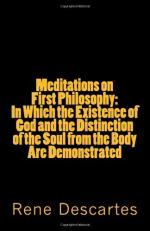with so entire certainty that it is not in my power
ever to doubt of it in earnest; and I should be inconsistent
with myself if I dared to say the contrary.
Can the proof of our religion be more evident and
convincing? We cannot doubt of the existence
of God unless we doubt of our own liberty; from whence
I infer that no man can seriously doubt of the being
of the Deity, since no man can entertain a serious
doubt about his own liberty. If, on the contrary,
it be frankly acknowledged that men are really free,
nothing is more easy than to demonstrate that the
liberty of man’s will cannot consist of any
combination of atoms, if one supposes that there was
no first mover, who gave matter arbitrary laws for
its motion. Motion must be essential to bodies,
and all the laws of motion must also be as necessary
as the essences of natures are. Therefore, according
to this system, all the motions of bodies must be
performed by constant, necessary, and immutable laws;
the motion in a straight line must be essential to
all atoms, that are not made to deviate from it by
the encounter of other atoms; the straight line must
likewise be essential either upwards or downwards,
either from right to left, or left to right, or some
other diagonal way, fixed, precise, and immutable.
Besides, it is evident that no atom can make another
atom deviate; for that other atom carries also in its
essence the same invincible and eternal determination
to follow the straight line the same way. From
hence it follows that all the atoms placed at first
on different lines must pursue ad infinitum those
parallel lines without ever coming nearer one another;
and that those who are in the same line must follow
one another ad infinitum without ever coming up together,
but keeping still the same distance from one another.
The clinamen, as we have already shown, is manifestly
impossible: but, contrary to evident truth,
supposing it to be possible, in such a case it must
be affirmed that the clinamen is no less necessary,
immutable, and essential to atoms than the straight
line. Now, will anybody say that an essential
and immutable law of the local motion of atoms explains
and accounts for the true liberty of man? Is
it not manifest that the clinamen can no more account
for it than the straight line itself? The clinamen,
supposing it to be true, would be as necessary as the
perpendicular line, by which a stone falls from the
top of a tower into the street. Is that stone
free in its fall? However, the will of man,
according to the principle of the clinamen, has no
more freedom than that stone. Is it possible
for man to be so extravagant as to dare to contradict
his own conscience about his free-will, lest he should
be forced to acknowledge his God and maker? To
affirm, on the one hand, that the liberty of man is
imaginary, we must silence the voice and stifle the
sense of all nature; give ourselves the lie in the
grossest manner; deny what we are most intimately conscious




